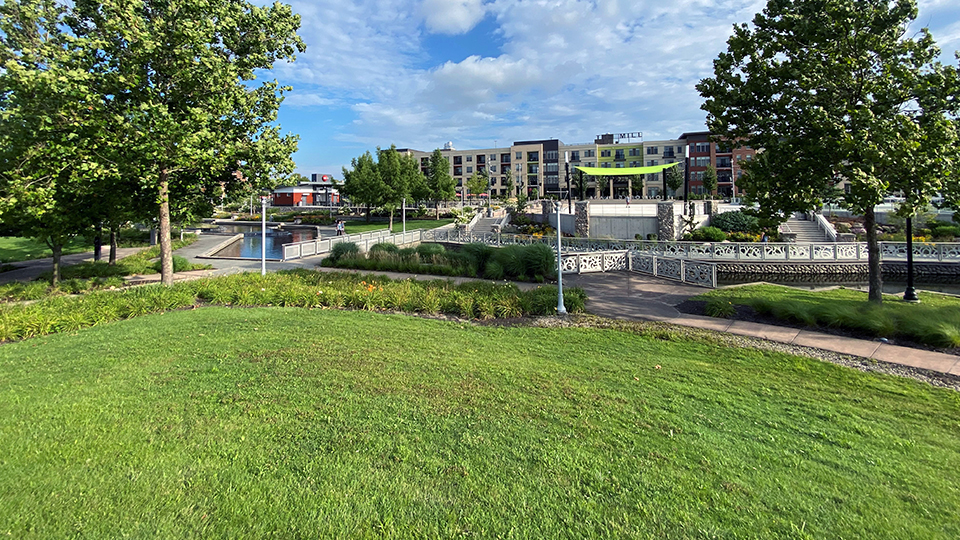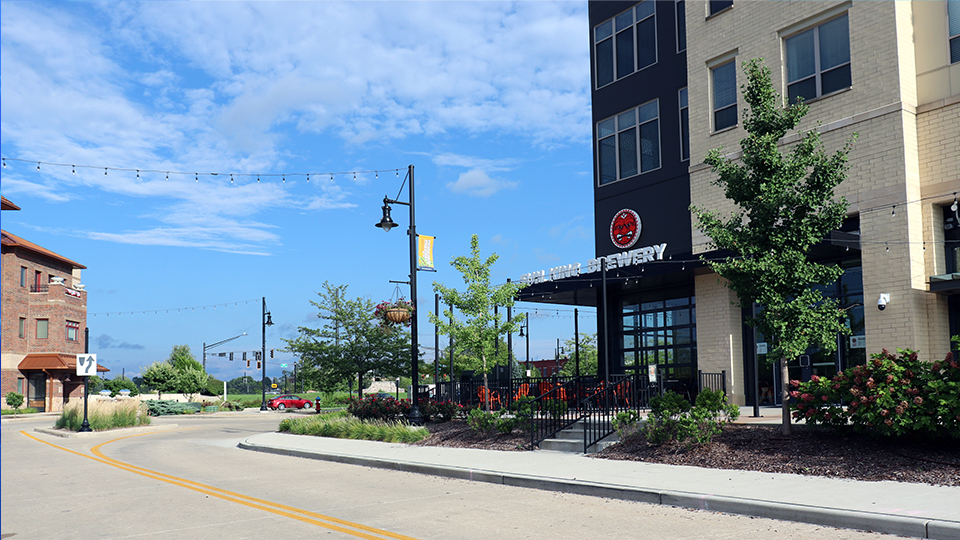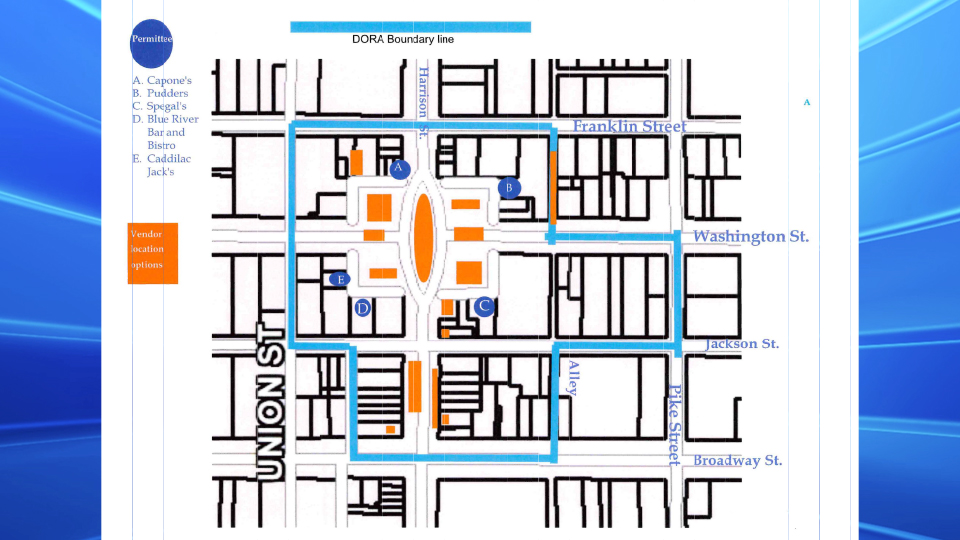Open drinks downtown? Indiana cities explore outdoor refreshment areas
Subscriber Benefit
As a subscriber you can listen to articles at work, in the car, or while you work out. Subscribe Now
Hoosiers may soon be able to leave a bar or restaurant with an open drink in hand.
A new state law took effect this summer allowing Hoosier cities to create their own Designated Outdoor Refreshment Areas, or DORAs.
The areas, allowed already in neighboring states like Michigan and Ohio, allow patrons to walk freely with their favorite beer, wine or cocktail in clearly defined outdoor spaces established by local leaders.
Several Indiana cities have been quick to explore the option as a means for supplementing outdoor festivals or to attract people into downtown spaces. For some, the new law brings an ease to planning outdoor events in common areas that would otherwise require additional layers of approval for alcohol vendors. For others, the new law brings an opportunity to increase foot traffic to local shops and spur new business, especially in smaller communities.
Sen. Liz Brown discusses the possible uses of DORA.
“Larger communities have the ability to create large outdoor spaces already,” said Sen. Liz Brown, R-Fort Wayne, hoping DORA districts can serve as one tool to increase visitors in areas passersby may otherwise overlook. “These smaller communities now want to be able to offer that gathering spot and I think that’s where we will really see the economic impact.”
Brown authored the successful bill this year that outlines the process to create outdoor refreshment areas. The new state law allows cities the flexibility to design the areas as they see fit through local ordinance, but establishes some basic rules.
City officials must create a map of their proposed outdoor refreshment area, including the boundaries of the DORA and the location of participating bars and restaurants. Cities leaders can choose the specific hours and days that open drinks can be sold and carried throughout the DORA and signs must be posted throughout indicating the space is a designated refreshment area.

Cities may not establish their refreshment areas within 200 feet of a church or school unless a representative gives their written consent. And, those visiting the DORA are only allowed to carry up to two open drinks at a time of sizes no more than 10 to 16 ounces depending on the type of drink; beer, wine or cocktail.
Officials interviewed by Inside INdiana Business had a range of uses in mind for their proposed outdoor refreshment areas.
In Jasper, tourism officials hope a newly established social district can help recruit businesses to the city’s Courthouse Square, which was renovated this year with new sidewalks, streetscapes and gathering spaces with swings and a firepit. Kate Schwenk, director of the not-for-profit Heart of Jasper, said she sees the DORA as an opportunity to allow restaurants to drive business to local shops and stores on the square.
“We want it to be an economic driver in that aspect of the restaurants are supporting the retailers and now the retailers are providing more activity for the people who’ve come down to go out to eat and we can all work together to provide that experience downtown,” Schwenk said, “So, it’s not just ‘Let’s go to dinner and go home.’ It’s ‘let’s go to dinner and hang out downtown.’”
Officials in Mishawaka are exploring a DORA in its growing, riverfront Beutter Park and Ironworks Plaza area. Mayor Dave Wood said the outdoor refreshment area will allow the city and its partners like Sun King Brewery to more easily make use of an existing outdoor biergarten area and to nix temporary fencing needed now to separate out designated drink areas during summer markets and festivals.
Officials say removing these barriers will encourage visitors to more freely shop local vendors and enjoy entertainment in the park without being restricted to a small, fenced in area.

The city plans to put safeguards in place, like an increased security presence during special events and the use of designated cups carrying a DORA sticker indicating drinks sold in the refreshment area meet serving size requirements. Officials say they expect the first few months after establishing the DORA will come with a period of education so that the public understands what’s expected of them in the newly established space.
“It certainly will come in handy during events, but say right now there’s a waiting list to get a seat at Sun King,” Wood said. “It’s a beautiful evening and Sun King sells beer, maybe you want to buy a beer at the bar while you’re waiting for your table. You can walk across the street and sit down at the biergarten and enjoy the beautiful weather, so we see that it has some application during off-event times, too.”
Jennifer Meltzer discusses how DORA could be used in Shelbyville.
Some cities are exploring models that give local businesses within the DORA the flexibility to opt in or out of the plan. For example in Shelbyville, where officials are exploring a refreshment area encompassing several blocks downtown, officials say they will offer signs for local businesses that may want to opt out. Mishawaka says they’ll consider posting signs in businesses that choose to participate.
“I have a wedding dress shop in this DORA,” said Jennifer Meltzer, a state legislator and city attorney for Shelbyville. “I fully anticipate that the owner is going to go, ‘No, you cannot carry your glass of red wine into my wedding dress shop.’ She might allow it, but we’re leaving that up to those business owners.”
Though some have expressed concern the areas could change the atmosphere of parks or downtown districts, city officials almost universally say they envision these spaces being family-friendly — no different than an adult enjoying a glass of wine or beer at dinner with family at a restaurant.
Once city officials establish the rules of their outdoor refreshment areas, they must submit their plan to the Indiana Alcohol and Tobacco Commission for approval. Cities have the option of tweaking or removing a local ordinance creating their DORA at any time.

Local leaders can establish as many as seven DORAs within their city limits — though at this point, officials interviewed by Inside INdiana Business say they’re looking to start with one for now to see how things go. A spokesperson for the Alcohol and Tobacco Commission said the agency is aware of several cities’ interest in creating DORAs. However, to their knowledge, all are still in the local ordinance stages, therefore no requests have made their way yet to the agency for its approval.
Mishawaka officials say they’d like to have their DORA in place by an upcoming country festival in October and Shelbyville hopes to have theirs in place by Labor Day weekend. Schwenk said she expects ordinance proposals to be discussed in Jasper as early as September.
